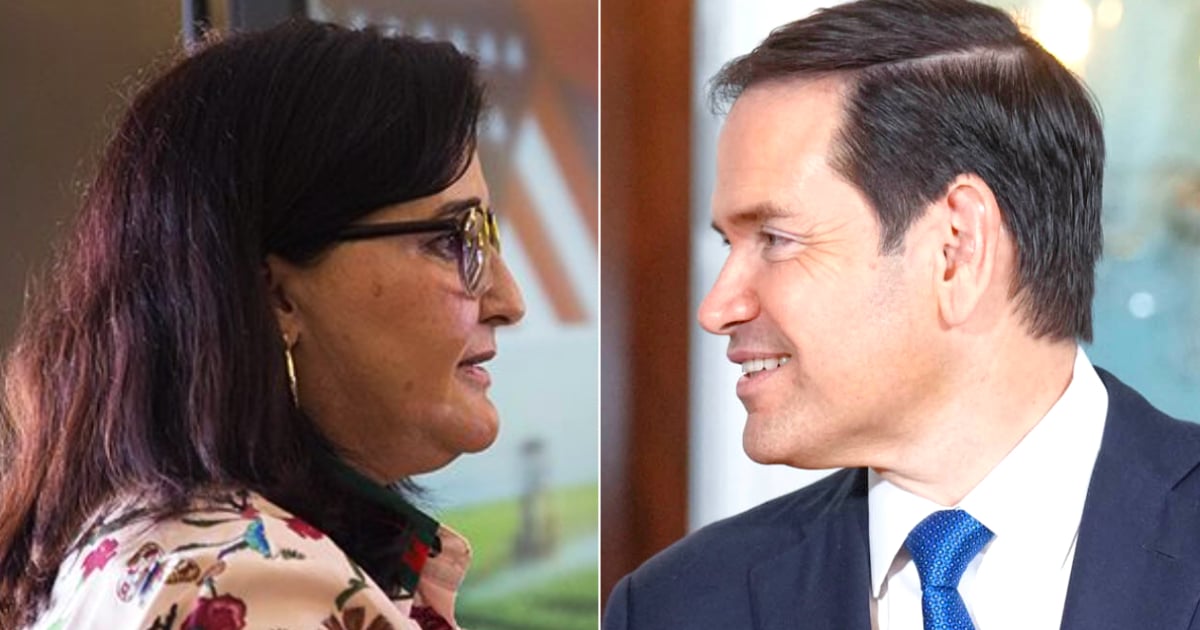Once again, Johana Tablada de la Torre, the Deputy Director General for the United States at Cuba's Ministry of Foreign Affairs (MINREX), has made headlines by delivering a scathing critique of the latest U.S. national security memorandum signed by President Donald Trump. This action intensifies the embargo and halts American tourism to the island. Tablada's response is steeped in the regime's typical narrative—an amalgam of propaganda, victimhood, and cynicism—attempting to obscure the government's accountability for the national crisis it has perpetuated for more than six decades.
In an attempt to bolster the faltering image of the Cuban regime, Tablada unleashed a barrage of melodramatic accusations. "How can one claim that strengthening an economic blockade... helps the Cuban people?" she questioned on social media. Her comments, dripping with disdain for Secretary of State Marco Rubio and Cuban-American politicians, fail even the simplest logical scrutiny.
The answer is straightforward: by applying pressure on a totalitarian regime that has hijacked national sovereignty and exploits state resources not for the welfare of Cubans, but to sustain a repressive apparatus, a military-business class, and an elite that transforms public poverty into personal gain. The sanctions target not the people, but the machinery that oppresses them.
Questioning the Realities of Freedom in Cuba
"How can one justify... that by stripping both peoples of freedoms and rights, liberty is defended?" Tablada queried further. One must ask the diplomat which freedoms she refers to: the ones her government systematically denies Cubans? The freedom to speak without the threat of imprisonment, as faced by numerous journalists, activists, and independent artists? The freedom to associate or form political parties, prohibited by the Constitution imposed by the Cuban Communist Party (PCC)? Or the freedom to thrive without depending on the clientelist network of a military-run enterprise like GAESA?
Tablada seems to overlook the absence of free elections, the lack of power separation, independent press, or judicial guarantees in Cuba. She speaks of "removing rights" as if the regime she represents hasn't institutionalized repression as a form of governance and state policy. Her hypocrisy peaks when discussing "suffocation," while her regime suffocates millions of Cubans under control, surveillance, and fear daily.
Distinguishing Between Economic Sanctions and Human Connections
"How can you criminalize travel, commerce, the livelihood of a country, and normalize the most inhumane blockade?" Tablada questions. The U.S. does not criminalize travel or commerce, but rather the financing of military and repressive structures that control the tourism sector, imports, exports, and the dollarized economy. The only sustenance provided to the population comes from ration books or dollar stores, a currency not used to pay its workers.
The regulations are about transactions with entities representing an apparatus of domination, not the people. The aim is to limit the opaque dealings of generals, not human contact between nations. And if we speak of an "inhumane blockade," we could start with the one the regime imposes by preventing Cubans from freely exiting the country or deciding their own fate without fear of persecution or exile.
In her propagandistic rant, Tablada accused Rubio of orchestrating every measure against the regime, portraying him as omnipotent, capable of controlling the presidential cabinet and dictating the foreign policy of the world's leading power. This perpetual conspiracy theory against Cuba is old, tiresome, and above all, ineffective.
The Ineffectiveness of Tablada's Accusations
The new memorandum is merely a continuation of a policy that differentiates between the Cuban people and their oppressors. It supports free internet access, independent media, the emergence of a real private economy, and the weakening of structures like GAESA, which concentrates the country's economic power in a military caste's hands.
Calling it a "little package" doesn't diminish its impact. What bothers the regime is not the content, but its effectiveness. Because they know the real blockade is not imposed by Washington, but by themselves around freedom, the right to choose, the possibility of change.
If the Cuban government truly cared about the suffering of families, it would initiate a democratic transition, allow free and plural elections, respect human rights, and end its absolute control over national life. Instead, it chooses to traffic in victimhood, conspiracies, and resentment. Until that changes, every measure that weakens the regime and strengthens the citizen will not only be justified but necessary.
Understanding U.S. Policies Towards Cuba
What is the purpose of the U.S. embargo on Cuba?
The U.S. embargo aims to pressure the Cuban regime to adopt democratic reforms and respect human rights by restricting its access to financial resources that support its repressive structures.
How does the embargo affect the Cuban people?
While the embargo targets the regime, it can indirectly impact the Cuban populace by limiting economic opportunities. However, the intention is to weaken the oppressive machinery, not the citizens themselves.
What changes could ease U.S. sanctions on Cuba?
The U.S. might consider easing sanctions if Cuba undertakes democratic reforms, allows free elections, respects human rights, and dismantles its repressive institutions.
